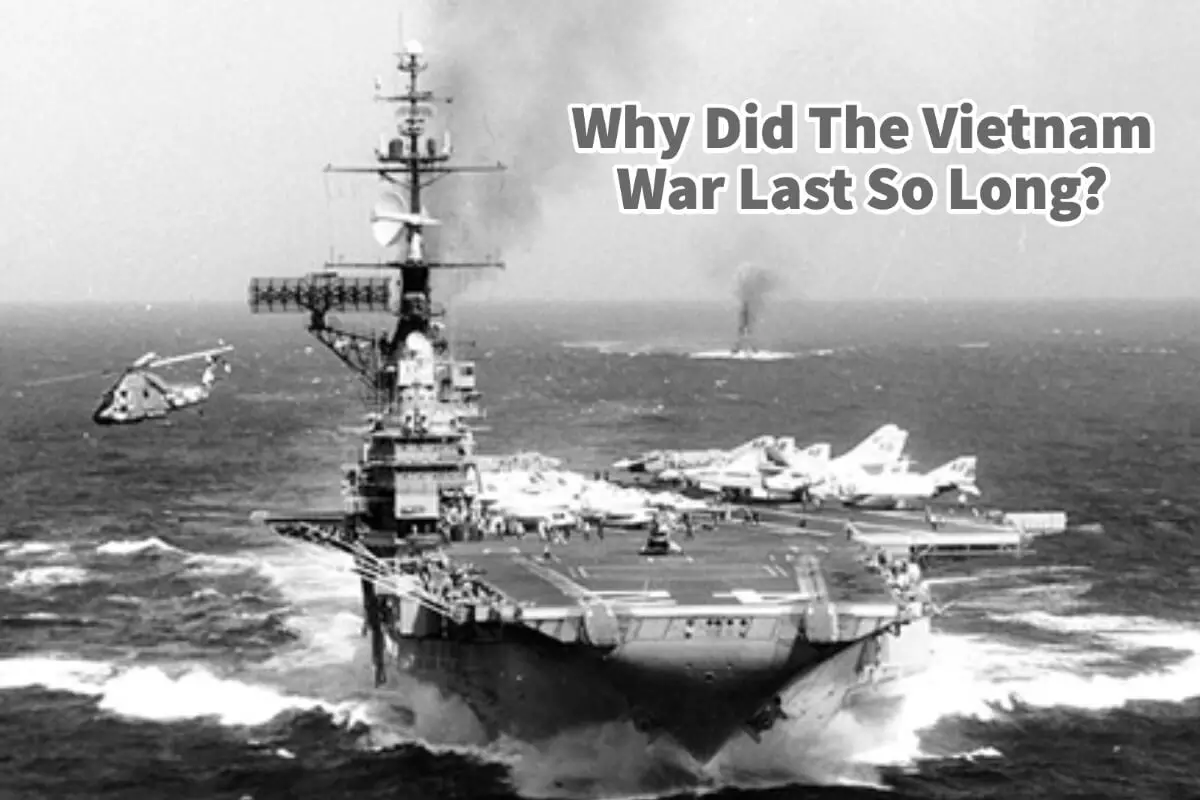Many Americans, myself included, may not understand the American involvement in the Vietnam War. In particular, many want to know why so many American lives were lost and why the war lasted so long.
When most historians look at the Vietnam War and why it lasted so long, they usually state five fundamental reasons, such as Vietnam wanting unification between North and South Vietnam and freedom from the French colonial power. And the fact United States started to prop up the weak and corrupt southern government because they believed in the Domino theory and used the flawed 1964 Gulf of Tonkin incident to get more support for American involvement.
Table of Contents
- 5 Main Reasons Why The Vietnam War Lasted So Long
- 10 Key Facts About the Vietnam War
- Frequently Asked Questions
- Related Questions
5 Main Reasons Why The Vietnam War Lasted So Long
Most historians will agree that there are five significant reasons why the Vietnam War lasted as long as it did. These reasons also help explain why the U.S. was heavily involved in the Vietnam conflict or Vietnam War.
Here are the five primary reasons for the Vietnam War:
Vietnam Wanted Unification Of The North And South
At the heart of the Vietnam conflict, the Vietnamese wanted to unify North and South Vietnam. Before World War II, Vietnam was part of the French empire and under the control of the French.
During World War II, Japan invaded Vietnam; when the Japanese were in Vietnam, the French were still there but could not defend Vietnam or the Vietnamese people from the Japanese invasion. After World War II, when the Japanese left in 1945, Ho Chi Minh, the North Vietnamese leader, captured Hanoi and declared independence for Vietnam.
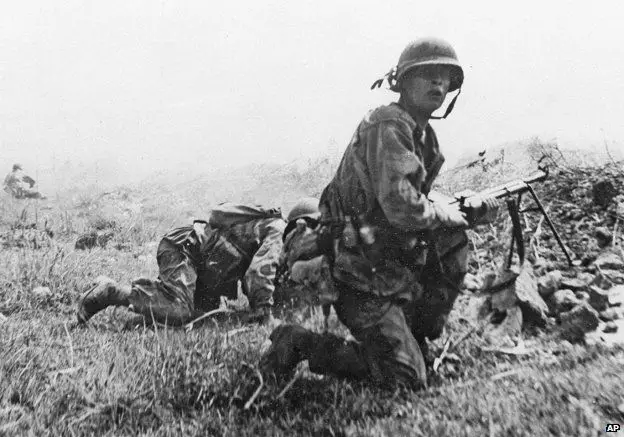
The French did not want to give up control of Vietnam. Many of them had a lot of investment in Vietnam, including rubber plantations and other types of manufacturing. Also, many French had made their home Vietnam and considered Vietnam part of France.
The French tried to retake control of Vietnam but were very unpopular with the Vietnamese. The Vietnam forces, under the leadership of the Viet Minh and Ho Chi Minh, continued to fight the French until the French were defeated in 1954 at Dien Bien Phu.
The French sustained huge losses at Dien Bien Phu, but Ho Chi Minh had earlier warned them of this when he said:
“You can kill ten of our men for every one we kill of yours. But even at those odds, you will lose and we will win.”
Ho Chi Minh
A Geneva Treaty of 1954 was agreed that Vietnam would be split in two, and Ho Chi Minh and the South by a capitalist republic leader Ngo Dinh Diem would lead North Vietnam. The North Vietnamese were unhappy with this agreement as they wanted Vietnam to be united into one country.
Vietnamese Civil War To Unite North And South Vietnam
The North Vietnamese were unhappy that the South was not part of North Vietnam. At this time, many in the South were also not happy with their leader. Ngo Dinh Diem; many Vietnamese saw him as a corrupt puppet of the Western governments. North Vietnamese had support from many people in the South.
In 1958, war broke out between North and South Vietnam; the North, under the leadership of Ho Chi Minh, was fighting for unification between North and South Vietnam.
In 1955, under the Southeast Asia Treaty Organization (SEATO), the United States had advisors in Vietnam to help stop the spread of the North communist expansion. At the time, the United States had about 700 military and other personnel in South Vietnam.
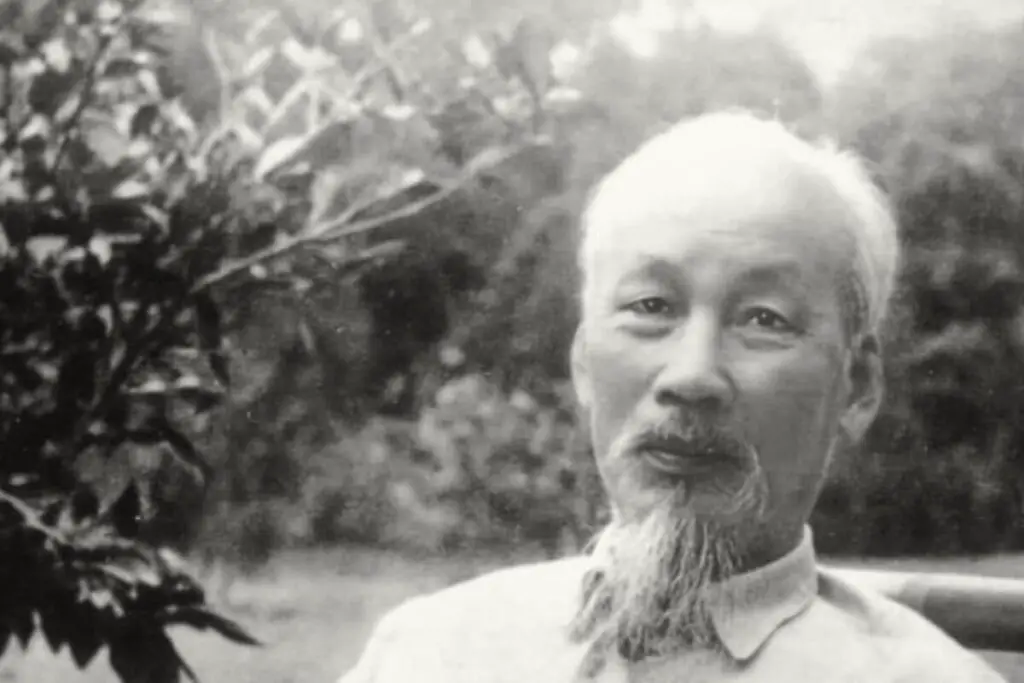
Ho Chi Minh, the leader of North Vietnam, famously said:
“The Vietnamese people deeply love independence, freedom and peace. But in the face of United States aggression they have risen up, united as one man.”
Ho Chi Minh
U.S. Involvement With Failed Belief In The Domino Theory
The United States had a flawed belief that if one country fell to communism, there would be a domino effect where it would take over the entire world. This kind of Cold War mentality started with President Eisenhower and continued with several presidents after him.
The domino theory was also one of the main reasons the United States felt they needed to be in Vietnam and help prop up the South Vietnamese government. The US wanted to ensure that Vietnam would not become communist.
At the heart of this theory was, despite the cost to human life and other expenses to the Americans, many in the US government felt the war was worth the effort as long as communism was stopped and did not spread throughout the world.
In 1995, twenty years after the Vietnam War had ended and America withdrew from Vietnam, Robert McNamara wrote a book about Vietnam. I remember when this book came out, and many of us who had seen the effects of the Vietnam War firsthand were upset that now, twenty years later, a U.S. Official from this time would admit the war and the so-called Domino Theory was a failure.
Robert McNamara said this during an interview with the New York Times:
“There may be limits beyond which many Americans and much of the world will not permit the United States to go. The picture of the world’s greatest superpower killing or seriously injuring 1,000 noncombatants a week, while trying to pound a tiny backward nation into submission on an issue whose merits are hotly disputed, is not a pretty one. It could conceivably produce a costly distortion in the American national consciousness and in the world image of the United States…
Robert McNamara – New York Times
The domino theory enunciated by President Dwight D. Eisenhower and subscribed to by his three successors was wrong: The loss of South Vietnam never threatened to undermine the entire American position in Asia or to undercut United States credibility elsewhere.”
The Americans Were Propping Up A Weak South Vietnamese Government
The Americans were propping up a weak South Vietnamese government that President Diem led. Diem was known to be highly corrupt; he refused to give any peasants any land, which angered a large part of the population.
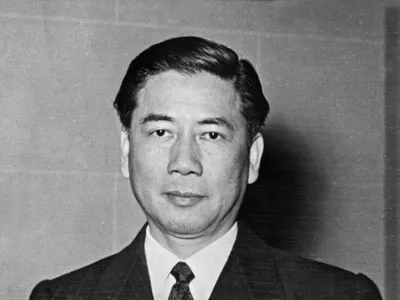
Pres Diem was a devout Catholic who looked down on a large Buddhist population in South Vietnam. As a result of these policies, most of the South Vietnamese population did not like him and were actively rebelling against him.
Ho Chi Minh and Viet Minh clearly understood the situation in South Vietnam and used it to get support in the South, mainly from the large Buddhist and peasant population.
In 1963, President John F Kennedy understood this was a problem, so he sent 16,000 military advisors to overthrow the Diem government. But Diem had destroyed the South Vietnam government so much there was never another prominent leader that could help to lead South Vietnam to victory over North Vietnam.
Ho Chi Minh was a far more popular leader in South Vietnam than Diem or any other leader who came after Diem. This ensured that South Vietnam would eventually be doomed to fail and North Vietnam would take over the country.
In 1995, in the New York Times, Robert McNamara said this about the situation in South Vietnam.
“By the mid-1960’s it was clear that political stability did not exist and was unlikely to be achieved and the South Vietnamese, even with our training, assistance and logistical support, were incapable of defending themselves.”
Robert McNamara – New York Times
Even by the mid-1960s, Americans understood that the Vietnam War could not be won. Still, Americans continued to spend on military personnel, instituted a military draft, and fought a war the government was unsure America would ever win.
The 1964 Gulf Of Tonkin Incident Escalated The Situation In Vietnam
On 2 August 1964, the North Vietnamese attacked the U.S. Navy destroyer, USS Maddox. The USS Maddox was patrolling in the Gulf of Tonkin, off the coast of Vietnam.
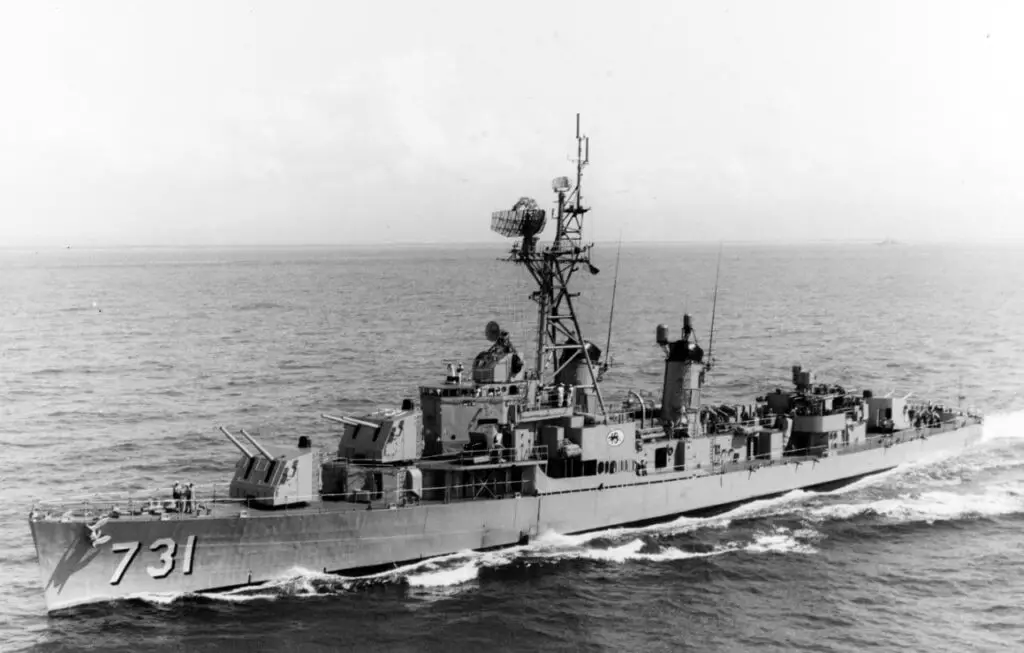
Two days later, on 4 August 1964, another attack on the US Maddock took place by North Vietnamese forces. On 4 August, the weather conditions were poor; many American soldiers doubted whether an attack had occurred.
The Gulf of Tonkin incident gave President Lyndon Johnson what he needed to present to Congress and why he needed to escalate the Vietnam War. Congress never officially declared war on Vietnam; this is why, in America, it was never called the Vietnam War but always called the Vietnam conflict.
It was later discovered that the U.S. Secretary of Defense, Robert McNamara, intentionally withheld information from Congress about the U.S. support of the South Vietnamese and the US attacks on the North Vietnamese radar stations and other targets.
The US Congress believed the attack on the US Maddox in the Gulf of Tonkin was an unprovoked attack of aggression by the North Vietnamese. Today, we know this was not precisely the case of what happened in those few days in 1964 on the Gulf of Tonkin.
In 1964, the U.S. Congress made a resolution called the Gulf of Tonkin, which essentially permitted President Johnson to wage the unofficially Congressional-sanctioned war on North Vietnam. It also allowed President Johnson to bring in more American troops, money, and American resources to fight this war.
In 1995, in his book “In Retrospect: The Tragedy and Lessons Of Vietnam” the former U.S. Secretary of Defense under Pres Johnson said this about the Vietnam War:
“We were wrong, terribly wrong. We owe it to future generations to explain why.”
Robert McNamara – new York Times
Over the next ten years, the United States’ involvement in Vietnam increased. By 1968, over half a million American troops were in Vietnam, and the war was costing the American people seven $77 billion a year.
When the Vietnam War ended, over 3 million Vietnamese and over 58,000 American lives would have been lost. It was a high cost on both sides of fighting for a war that should never have been fought in the first place.
10 Key Facts About the Vietnam War
The Vietnam War, often referred to in Vietnam as the “Resistance War Against America,” was a prolonged and highly contentious conflict that had profound effects on Vietnam, the United States, and the world.
Here are ten critical facts about the Vietnam War:
- Origins in Colonial Struggle: The roots of the Vietnam War can be traced back to the late 1940s when the Vietnamese waged an anti-colonial war against the French colonial administration. This conflict culminated in the French defeat at Dien Bien Phu in 1954.
- Geneva Accords: Following the French defeat, the 1954 Geneva Accords temporarily divided Vietnam at the 17th parallel, with Ho Chi Minh’s communist forces in the North and Emperor Bao Dai’s regime in the South.
- US Involvement: Fearing the spread of communism (the “Domino Theory”), the U.S. began to support the South Vietnamese government, escalating its involvement throughout the 1960s.
- Gulf of Tonkin Incident: In 1964, after a reported attack on U.S. Navy ships in the Gulf of Tonkin, the U.S. Congress passed the Gulf of Tonkin Resolution, which authorized increased military involvement in Southeast Asia.
- Peak U.S. Troop Levels: By 1969, at the height of the war, the U.S. had more than 500,000 troops stationed in Vietnam.
- Viet Cong & Tet Offensive: The Viet Cong, a South Vietnamese communist force, in alliance with the North, launched the Tet Offensive in 1968, attacking over 100 major cities and bases in South Vietnam. Though it was a military loss for the communists, the offensive had a profound psychological impact, diminishing U.S. public support for the war.
- Anti-War Movement: The Vietnam War saw significant opposition, especially among American youth. Protests, demonstrations, and acts of civil disobedience became commonplace as the war dragged on, reflecting the country’s deep divisions.
- Paris Peace Accords: In 1973, after lengthy negotiations, the U.S. and North Vietnam signed the Paris Peace Accords, leading to the withdrawal of American troops. However, the fighting between North and South Vietnam continued.
- Fall of Saigon: On April 30, 1975, the North Vietnamese army captured Saigon, the capital of South Vietnam. This marked the official end of the Vietnam War and the beginning of the formal reunification of Vietnam under communist control.
- Lasting Impact: The Vietnam War had lasting ramifications. In the U.S., it led to a more cautious foreign policy and widespread mistrust in government. In Vietnam, the war killed an estimated 2-3 million Vietnamese and left psychological and environmental scars due to intense warfare and chemical agents like Agent Orange.
The Vietnam War serves as a cautionary tale about the complexities of interventionist policies, the unpredictability of guerrilla warfare, and the unintended consequences of prolonged conflict. Its lessons remain relevant in geopolitical dialogues and strategies even today.
At A Bus On A Dusty Road, we talk about history, travel, life, sailing, and ex-pat living. We are all about “Living Life As A Global Citizen.” We explore social, cultural, and economic issues and travel.
We would love to have you be part of our community. Sign up for our newsletter to keep up-to-date by clicking here. If you have any questions, you can contact me, Anita, by clicking here.
Listen to our Podcast called Dusty Roads. You can find it on all major podcast platforms. Try out listening to one of our podcasts by clicking here.
Subscribe to our A Bus On A Dusty Road YouTube Channel with great videos and information by clicking here.
Frequently Asked Questions
Why did the Vietnam War last so long?
The Vietnam War endured for several reasons, including deep-seated historical issues within Vietnam, Cold War dynamics, and the United States’ commitment to containing communism.
What role did the Cold War play in the duration of the Vietnam War?
The Cold War rivalry between the United States and the Soviet Union influenced the Vietnam conflict. The U.S. viewed Vietnam as a battleground in the larger struggle against communism, leading to prolonged involvement.
How did the desire for Vietnamese unification contribute to the protracted war?
Vietnam’s longstanding aspiration for reunification, with the North seeking to unite with the South, fueled the conflict. This goal intensified the determination of the Vietnamese to resist foreign intervention.
What was the Domino Theory, and how did it impact the war’s duration?
The Domino Theory, which posited that the fall of one Southeast Asian nation to communism would lead to a chain reaction, influenced U.S. policy. Fear of a broader communist influence contributed to the U.S. commitment to Vietnam and prolonged engagement.
Why did the U.S. support the southern government in Vietnam?
The U.S. backed the southern government due to its anti-communist stance, rooted in the belief that supporting non-communist regimes was crucial for preventing the spread of communism in the region.
How did the Gulf of Tonkin incident contribute to the length of the war?
The Gulf of Tonkin incident, where an alleged attack on U.S. ships occurred in 1964, served as a catalyst for increased American involvement. The subsequent Gulf of Tonkin Resolution granted President Johnson broad war powers, escalating the conflict.
Were there internal factors in the U.S. that contributed to the war’s duration?
Factors such as political and public commitment, changing administrations, and the fear of appearing weak in the face of global communism influenced the U.S. decision to stay engaged in Vietnam.
What role did guerrilla warfare play in prolonging the conflict?
The Viet Cong’s effective use of guerrilla tactics made it challenging for the U.S. military to secure a decisive victory. This unconventional warfare contributed to the protracted nature of the conflict.
How did the complexity of Vietnamese politics impact the duration of the war?
The intricate political landscape in Vietnam, marked by internal divisions and shifting alliances, added to the complexity of the conflict. Resolving these internal issues contributed to the war’s duration.
When and how did the U.S. ultimately withdraw from Vietnam?
The U.S. withdrew from Vietnam in stages, with the Paris Peace Accords signed in 1973. However, the war continued for two more years, and the fall of Saigon in 1975 marked the official end of U.S. involvement in Vietnam. The war’s duration reflected the complexity of disengagement amid domestic and international pressures.
Related Questions
What U. S Companies Profited During The Vietnam War?
During the Vietnam War, many U.S. companies profited from the Vietnam war. Some of these companies were heading toward bankruptcy, but their involvement in the Vietnam war helped make them profitable. For many others, they earned millions of dollars each year in profits from the war that helped ensure they continued to be successful or even thriving companies.
By clicking here, you can discover What U. S Companies Profited During The Vietnam War?
Could America Have Won The Vietnam War?
America could not have won the Vietnam war as it never won the hearts and minds of the Vietnamese people. The Americans even had difficulty controlling the Vietnamese people in Southern Vietnam, as many were disillusioned with the Southern Vietnamese government. Ho Chi Minh, the leader of North Vietnam, fully understood that another foreign power would not control the Vietnamese heart and soul.
By clicking here, you can discover Could America Have Won The Vietnam War?
What Was The Main Reason For US Involvement In Vietnam?
The main reason for the involvement of the United States in the Vietnam War was the belief in the Domino theory; the Domino theory was a principle used to describe the effects on the world if Vietnam fell to communism. The idea was that if Vietnam became communist, the rest of Asia, New Zealand, and Australia would eventually become communist. At the time, American leaders felt they were fighting for the survival of democracy throughout the world.
By clicking here, you can learn more by reading What Was The Main Reason For U.S. Involvement In Vietnam?

